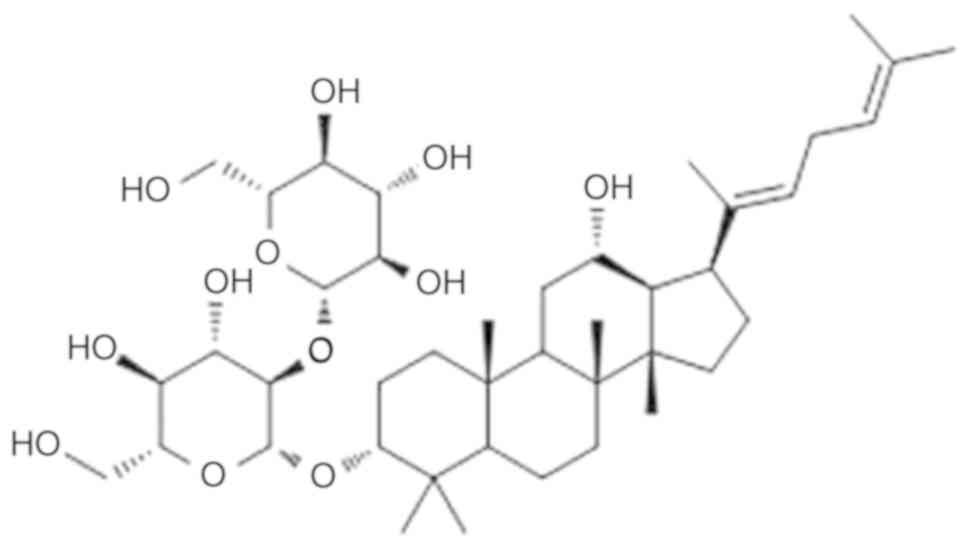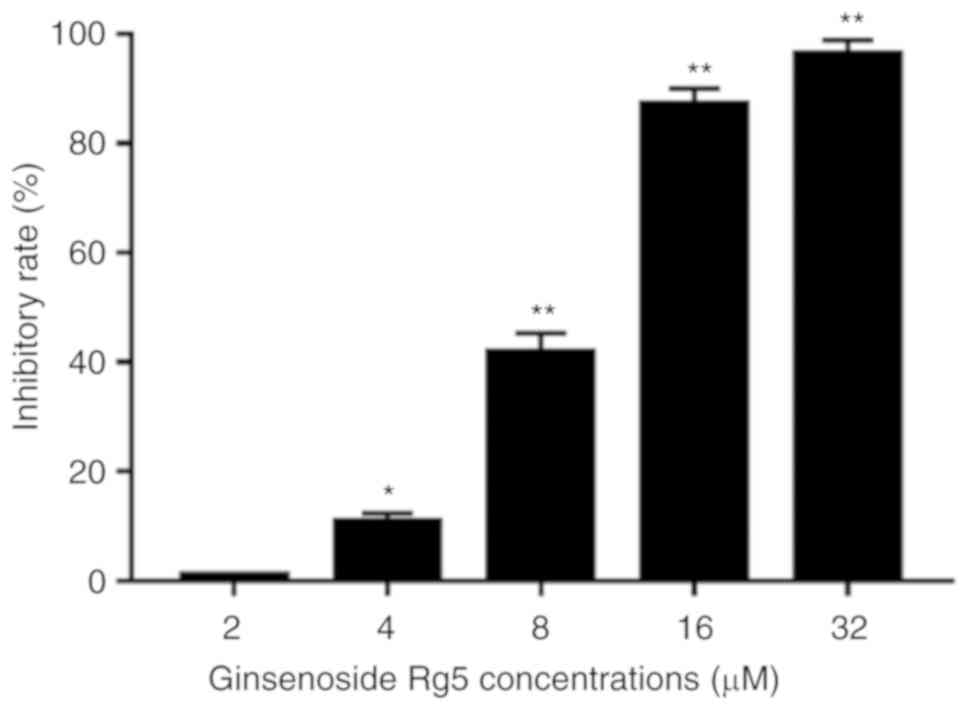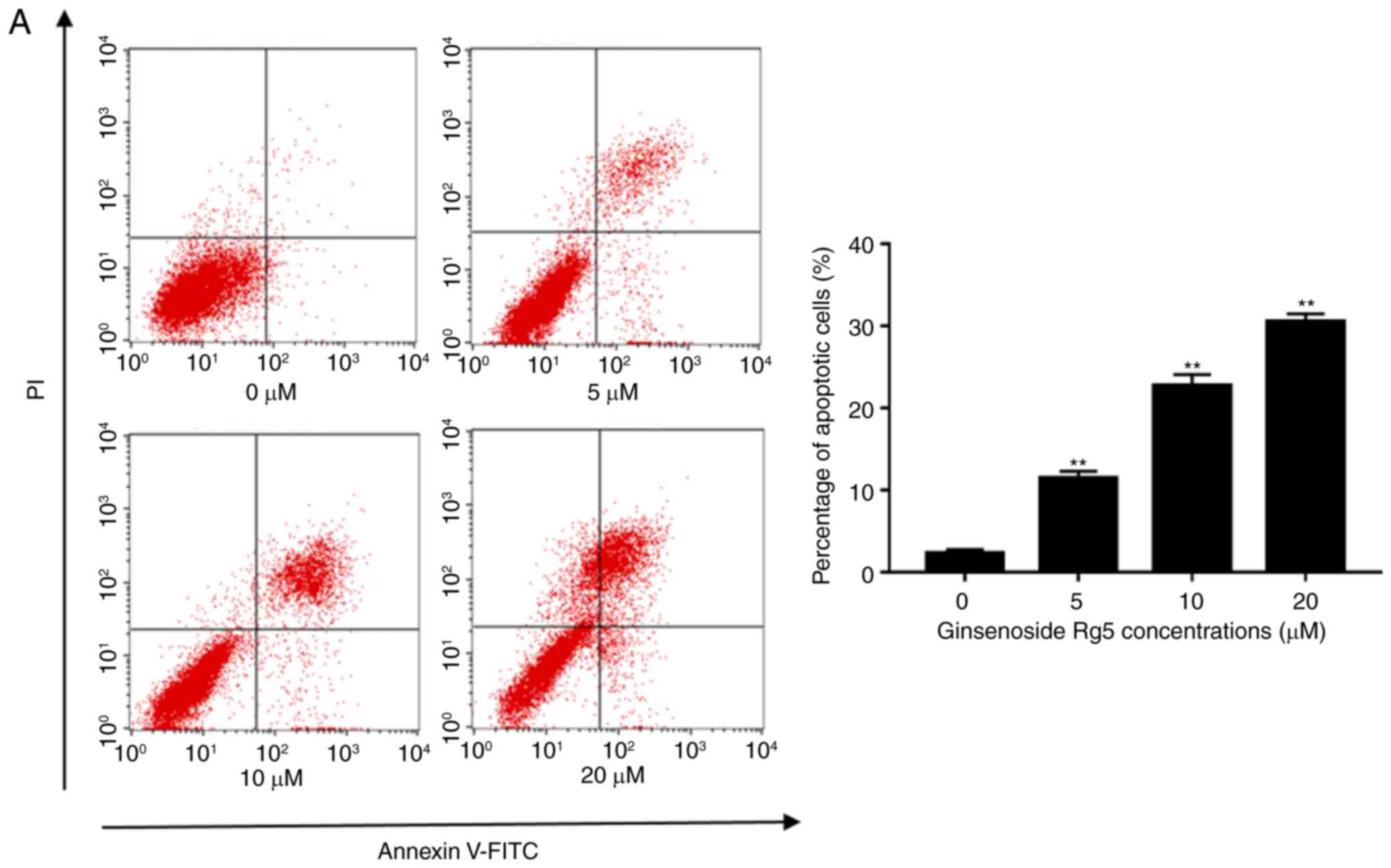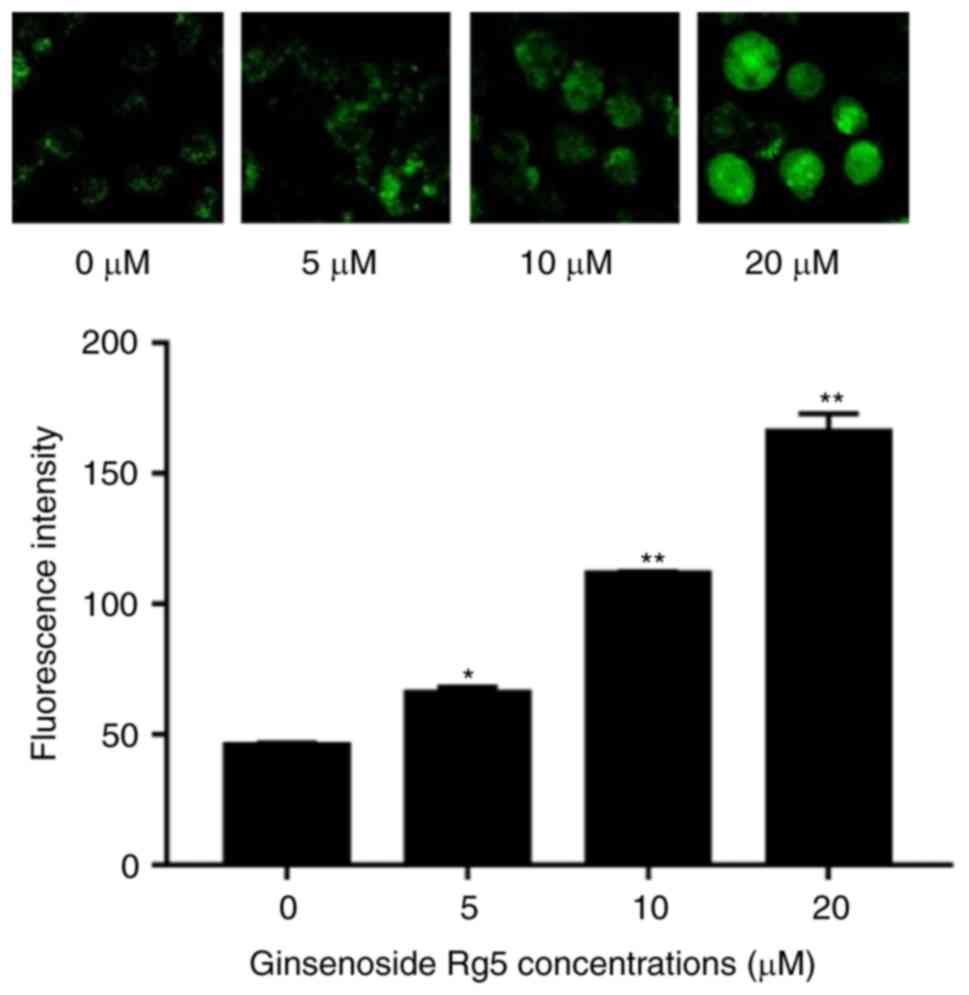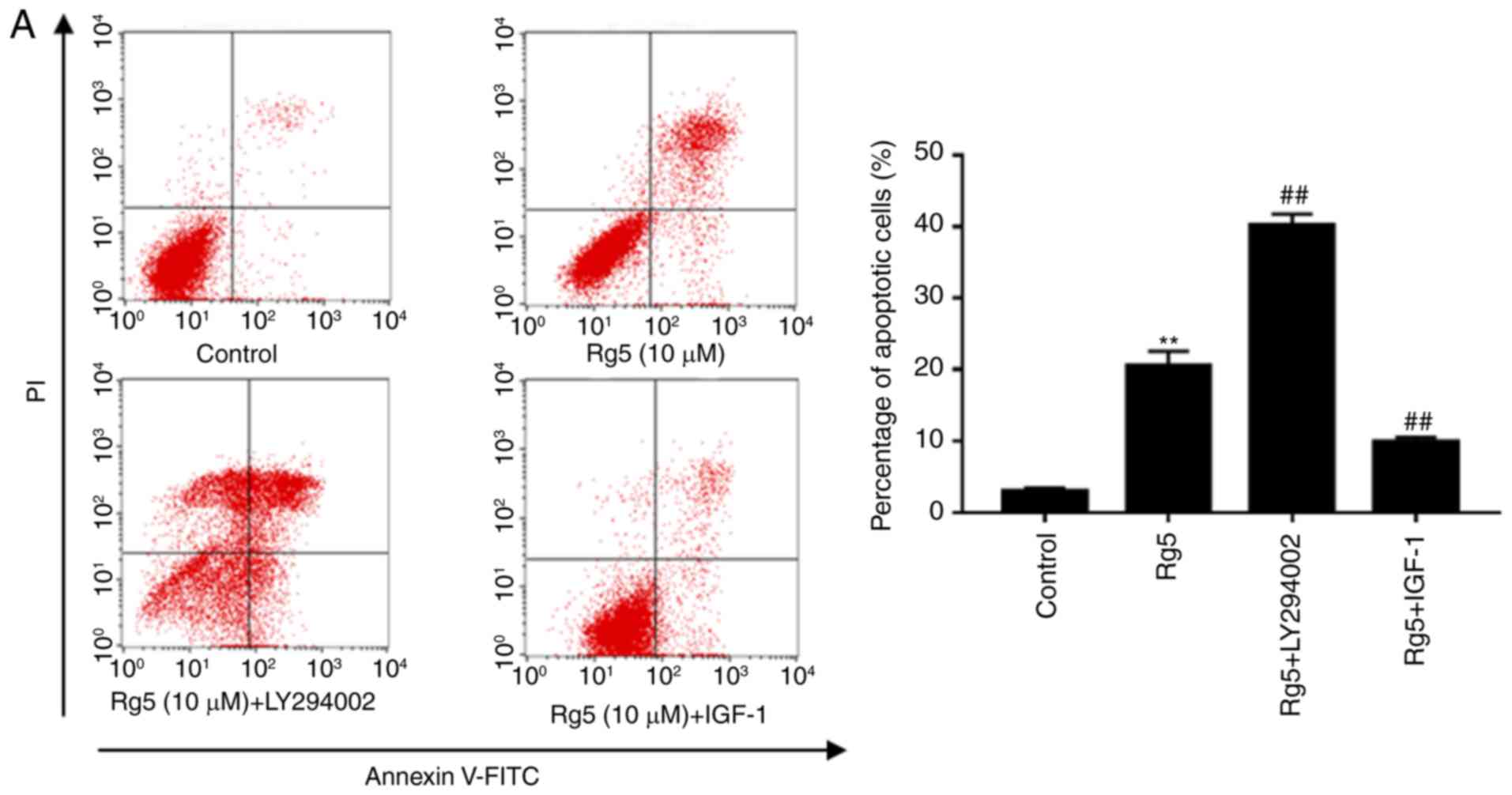|
1
|
Yun TK, Lee YS, Lee YH, Kim SI and Yun HY:
Anticarcinogenic effect of Panax ginseng C.A. Meyer and
identification of active compounds. J Korean Med Sci. 16
(Suppl):S6–S18. 2001. View Article : Google Scholar : PubMed/NCBI
|
|
2
|
De Souza LR, Jenkins AL, Sievenpiper JL,
Jovanovski E, Rahelić D and Vuksan V: Korean red ginseng (Panax
ginseng C.A. Meyer) root fractions: Differential effects on
postprandial glycemia in healthy individuals. J Ethnopharmacol.
137:245–250. 2011. View Article : Google Scholar : PubMed/NCBI
|
|
3
|
Varjas T, Nowrasteh G, Budán F, Nadasi E,
Horváth G, Makai S, Gracza T, Cseh J and Ember I: Chemopreventive
effect of Panax ginseng. Phytother Res. 23:1399–1403. 2009.
View Article : Google Scholar : PubMed/NCBI
|
|
4
|
Helms S: Cancer prevention and
therapeutics: Panax ginseng. Altern Med Rev. 9:259–274.
2004.PubMed/NCBI
|
|
5
|
Shin HR, Kim JY, Yun TK, Morgan G and
Vainio H: The cancer-preventive potential of Panax ginseng: A
review of human and experimental evidence. Cancer Causes Control.
11:565–576. 2000. View Article : Google Scholar : PubMed/NCBI
|
|
6
|
Kim SN, Ha YW, Shin H, Son SH, Wu SJ and
Kim YS: Simultaneous quantification of 14 ginsenosides in Panax
ginseng C.A. Meyer (Korean red ginseng) by HPLC-ELSD and its
application to quality control. J Pharm Biomed Anal. 45:164–170.
2007. View Article : Google Scholar : PubMed/NCBI
|
|
7
|
Nag SA, Qin JJ, Wang W, Wang MH, Wang H
and Zhang R: Ginsenosides as anticancer agents: In vitro and in
vivo activities, structure-activity relationships, and molecular
mechanisms of action. Front Pharmacol. 3:252012. View Article : Google Scholar : PubMed/NCBI
|
|
8
|
Lee KY, Lee YH, Kim SI, Park JH and Lee
SK: Ginsenoside-Rg5 suppresses cyclin E-dependent protein kinase
activity via up-regulating p21Cip/WAF1 and down-regulating cyclin E
in SK-HEP-1 cells. Anticancer Res. 17:1067–1072. 1997.PubMed/NCBI
|
|
9
|
Shin YW, Bae EA and Kim DH: Inhibitory
effect of ginsenoside Rg5 and its metabolite ginsenoside Rh3 in an
oxazolone-induced mouse chronic dermatitis model. Arch Pharm Res.
29:685–690. 2006. View Article : Google Scholar : PubMed/NCBI
|
|
10
|
Kim EJ, Jung IH, Van Le TK, Jeong JJ, Kim
NJ and Kim DH: Ginsenosides Rg5 and Rh3 protect scopolamine-induced
memory deficits in mice. J Ethnopharmacol. 146:294–299. 2013.
View Article : Google Scholar : PubMed/NCBI
|
|
11
|
Lee YY, Park JS, Jung JS, Kim DH and Kim
HS: Anti-inflammatory effect of ginsenoside Rg5 in
lipopolysaccharide-stimulated BV2 microglial cells. Int J Mol Sci.
14:9820–9833. 2013. View Article : Google Scholar : PubMed/NCBI
|
|
12
|
Ferlay J, Soerjomataram I, Dikshit R, Eser
S, Mathers C, Rebelo M, Parkin DM, Forman D and Bray F: Cancer
incidence and mortality worldwide: Sources, methods and major
patterns in GLOBOCAN 2012. Int J Cancer. 136:E359–E386. 2015.
View Article : Google Scholar : PubMed/NCBI
|
|
13
|
Song Y, Li L, Ou Y, Gao Z, Li E, Li X,
Zhang W, Wang J, Xu L, Zhou Y, et al: Identification of genomic
alterations in oesophageal squamous cell cancer. Nature. 509:91–95.
2014. View Article : Google Scholar : PubMed/NCBI
|
|
14
|
Tachibana M, Kinugasa S, Hirahara N and
Yoshimura H: Lymph node classification of esophageal squamous cell
carcinoma and adenocarcinoma. Eur J Cardiothorac Surg. 34:427–431.
2008. View Article : Google Scholar : PubMed/NCBI
|
|
15
|
Ouyang L, Shi Z, Zhao S, Wang FT, Zhou TT,
Liu B and Bao JK: Programmed cell death pathways in cancer: A
review of apoptosis, autophagy and programmed necrosis. Cell
Prolif. 45:487–498. 2012. View Article : Google Scholar : PubMed/NCBI
|
|
16
|
Streeter OE Jr, Martz KL, Gaspar LE,
Delrowe JD, Asbell SO, Salter MM and Roach M III: Does race
influence survival for esophageal cancer patients treated on the
radiation and chemotherapy arm of RTOG #85-01? Int J Radiat Oncol
Biol Phys. 44:1047–1052. 1999. View Article : Google Scholar : PubMed/NCBI
|
|
17
|
Danial NN and Korsmeyer SJ: Cell death:
Critical control points. Cell. 116:205–219. 2004. View Article : Google Scholar : PubMed/NCBI
|
|
18
|
Schönfelder U, Radestock A, Elsner P and
Hipler UC: Cyclodextrin-induced apoptosis in human keratinocytes is
caspase-8 dependent and accompanied by mitochondrial cytochrome c
release. Exp Dermatol. 15:883–890. 2006. View Article : Google Scholar : PubMed/NCBI
|
|
19
|
Kale J, Liu Q, Leber B and Andrews DW:
Shedding light on apoptosis at subcellular membranes. Cell.
151:1179–1184. 2012. View Article : Google Scholar : PubMed/NCBI
|
|
20
|
Robinson JA, Jenkins NS, Holman NA,
Roberts-Thomson SJ and Monteith GR: Ratiometric and nonratiometric
Ca2+ indicators for the assessment of intracellular free Ca2+ in a
breast cancer cell line using a fluorescence microplate reader. J
Biochem Biophys Methods. 58:227–237. 2004. View Article : Google Scholar : PubMed/NCBI
|
|
21
|
Wang YS, Lin Y, Li H, Li Y, Song Z and Jin
YH: The identification of molecular target of (20S) ginsenoside Rh2
for its anti-cancer activity. Sci Rep. 7:124082017. View Article : Google Scholar : PubMed/NCBI
|
|
22
|
Choi YJ, Lee HJ, Kang DW, Han IH, Choi BK
and Cho WH: Ginsenoside Rg3 induces apoptosis in the U87MG human
glioblastoma cell line through the MEK signaling pathway and
reactive oxygen species. Oncol Rep. 30:1362–1370. 2013. View Article : Google Scholar : PubMed/NCBI
|
|
23
|
Sun C, Guo XX, Zhu D, Xiao C, Bai X, Li Y,
Zhan Z, Li XL, Song ZG and Jin YH: Apoptosis is induced in cancer
cells via the mitochondrial pathway by the novel xylocydine-derived
compound JRS-15. Int J Mol Sci. 14:850–870. 2013. View Article : Google Scholar : PubMed/NCBI
|
|
24
|
Liang LD, He T, Du TW, Fan YG, Chen DS and
Wang Y: Ginsenoside-Rg5 induces apoptosis and DNA damage in human
cervical cancer cells. Mol Med Rep. 11:940–946. 2015. View Article : Google Scholar : PubMed/NCBI
|
|
25
|
Kim SJ and Kim AK: Anti-breast cancer
activity of Fine Black ginseng (Panax ginseng Meyer) and
ginsenoside Rg5. J Ginseng Res. 39:125–134. 2015. View Article : Google Scholar : PubMed/NCBI
|
|
26
|
Li W, Yan MH, Liu Y, Liu Z, Wang Z, Chen
C, Zhang J and Sun YS: Ginsenoside Rg5 Ameliorates
Cisplatin-induced nephrotoxicity in mice through inhibition of
inflammation, oxidative Stress, and apoptosis. Nutrients. 8(pii):
E5662016. View Article : Google Scholar : PubMed/NCBI
|
|
27
|
Yang YL, Li J, Liu K, Zhang L, Liu Q, Liu
B and Qi LW: Ginsenoside rg5 increases cardiomyocyte resistance to
ischemic injury through regulation of mitochondrial hexokinase-II
and dynamin-related protein 1. Cell Death Dis. 8:e26252017.
View Article : Google Scholar : PubMed/NCBI
|
|
28
|
Shin MS, Song JH, Choi P, Lee JH, Kim SY,
Shin KS, Ham J and Kang KS: Stimulation of innate immune function
by Panax ginseng after heat processing. J Agric Food Chem.
66:4652–4659. 2018. View Article : Google Scholar : PubMed/NCBI
|
|
29
|
Heiskanen KM, Bhat MB, Wang HW, Ma J and
Nieminen A: Mitochondrial depolarization accompanies cytochrome c
release during apoptosis in PC6 cells. J Biol Chem. 26:5654–5658.
1999. View Article : Google Scholar
|
|
30
|
Chen H, Xu J, Lv Y, He P, Liu C, Jiao J,
Li S, Mao X and Xue X: Proanthocyanidins exert a neuroprotective
effect via ROS/JNK signaling in MPTP-induced Parkinson's disease
models in vitro and in vivo. Mol Med Rep. 18:4913–4921.
2018.PubMed/NCBI
|
|
31
|
Rasheed MZ, Tabassum H and Parvez S:
Mitochondrial permeability transition pore: A promising target for
the treatment of Parkinson's disease. Protoplasma. 254:33–42. 2017.
View Article : Google Scholar : PubMed/NCBI
|
|
32
|
Wu HY, Huang CH, Lin YH, Wang CC and Jian
TR: Cannabidiol induced apoptosis in human monocytes through
mitochondrial permeability transition pore-mediated ROS production.
Free Radic Biol Med. 124:311–318. 2018. View Article : Google Scholar : PubMed/NCBI
|
|
33
|
Shibayama-Imazu T, Aiuchi T and Nakaya K:
Vitamin K2-mediated apoptosis in cancer cells: Role of
mitochondrial transmembrane potential. Vitam Horm. 78:211–226.
2008. View Article : Google Scholar : PubMed/NCBI
|
|
34
|
Giorgi C, Romagnoli A, Pinton P and
Rizzuto R: Ca2+ signaling, mitochondria and cell death. Curr Mol
Med. 8:119–130. 2008. View Article : Google Scholar : PubMed/NCBI
|
|
35
|
Pinton P, Giorgi C, Siviero R, Zecchini E
and Rizzuto R: Calcium and apoptosis: ER-mitochondria Ca2+ transfer
in the control of apoptosis. Oncogene. 27:6407–6418. 2008.
View Article : Google Scholar : PubMed/NCBI
|
|
36
|
Oppenheim R: Naturally occurring cell
death during neural development. Trends Neurosci. 8:487–493. 1985.
View Article : Google Scholar
|
|
37
|
Granado-Serrano AB, Martin MA, Bravo L,
Goya L and Ramos S: Quercetin induces apoptosis via caspase
activation, regulation of Bcl-2, and inhibition of PI-3-kinase/Akt
and ERK pathways in a human hepatoma cell line (HepG2). Nutr.
136:2715–2721. 2006. View Article : Google Scholar
|
|
38
|
Xiang T, Fang Y and Wang SX: Quercetin
suppresses HeLa cells by blocking PI3K/Akt pathway. J Huazhong Univ
Sci Technol Med Sci. 34:740–744. 2014. View Article : Google Scholar : PubMed/NCBI
|
|
39
|
Wong MH, Xue A, Baxter RC, Pavlakis N and
Smith RC: Upstream and downstream co-inhibition of
mitogen-activated protein kinase and PI3K/Akt/mTOR pathways in
pancreatic ductal adenocarcinoma. Neoplasia. 18:425–435. 2016.
View Article : Google Scholar : PubMed/NCBI
|
|
40
|
Dillon LM, Bean JR, Yang W, Shee K,
Symonds LK, Balko JM, McDonald WH, Liu S, Gonzalez-Angulo AM, Mills
GB, et al: P-REX1 creates a positive feedback loop to activate
growth factor receptor, PI3K/AKT and MEK/ERK signaling in breast
cancer. Oncogene. 34:3968–3976. 2015. View Article : Google Scholar : PubMed/NCBI
|
|
41
|
Riquelme E, Behrens C, Lin HY, Simon G,
Papadimitrakopoulou V, Izzo J, Moran C, Kalhor N, Lee JJ, Minna JD
and Wistuba II: Modulation of EZH2 expression by MEK-ERK or
PI3K-AKT Signaling in lung cancer is Dictated by different KRAS
oncogene mutations. Cancer Res. 76:675–685. 2016. View Article : Google Scholar : PubMed/NCBI
|















